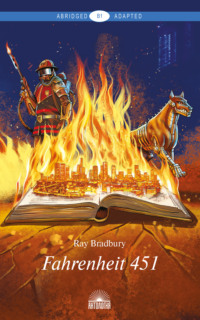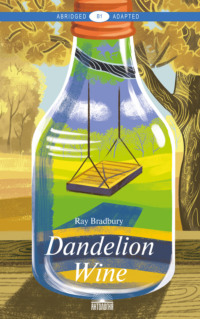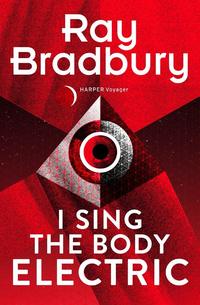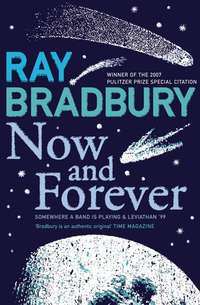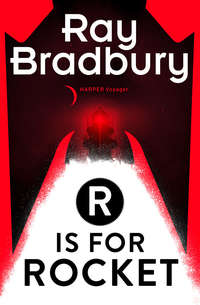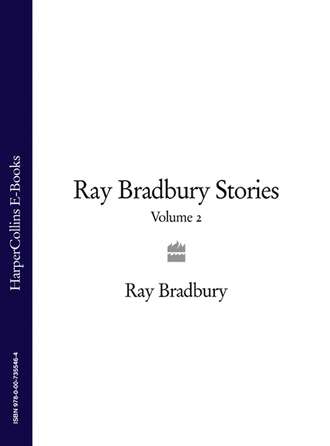
Полная версия
Ray Bradbury Stories Volume 2
And as if she had heard, quite suddenly her head lifted, her weeping grew less as she looked up at the moon, so that he saw her face.
And it was indeed a face seen somewhere once, but where?
A tear fell. She blinked.
It was like the blinking of a camera and a picture taken.
‘God save me!’ he whispered. ‘No!’
He whirled and stumbled toward the closet to seize down an avalanche of boxes and albums. In the dark he scrabbled, then pulled on the closet light, tossed aside six albums until finally, dragging another forth and riffling pages, he gave a cry, stopped, and held a photo close, then turned and moved blindly to the window.
There he stared down at the lawn and then at the photograph, very old, very yellowed with age.
Yes, yes, the same! The image struck his eyes and then his heart. His whole body shook, made an immense pulsation, as he leaned at the album, leaned on the window frame, and almost shouted:
You! How dare you come back! How dare you be young! How dare you be what? A girl untouched, wandering late on my lawn!? You were never that young! Never! Damn, oh, damn your warm blood, damn your wild soul!
But this he did not shout or say.
For something in his eyes, like a beacon, must have flashed.
The crying of the young woman on the lawn stopped.
She looked up.
At which instant the album fell from his fingers, through the burst-wide screen, and down like a dark bird fluttering to strike the earth.
The young woman gave a muted cry, whirled, and ran.
‘No, no!’ he cried aloud. ‘I didn’t mean – come back!’
He was down the stairs and out on the porch in a matter of seconds. The door slammed behind him like a gunshot. The explosion nailed him to the rail, half down to the lawn, where there was nothing to be seen but footprints. Either way, up the street lay empty sidewalks and shadows under trees. A radio played off in an upstairs window in a house behind trees. A car passed, murmuring, at a far intersection.
‘Wait,’ he whispered. ‘Come back. I shouldn’t have said—’
He stopped. He had said nothing, but only thought it. But his outrage, his jealousy?
She had felt that. She had somehow heard. And now …?
She’ll never come back, he thought. Oh God!
He sat on the porch steps for a while, quietly biting his knuckle.
At three in the morning, in bed, he thought he heard a sigh and soft footsteps in grass, and waited. The photo album lay closed on the floor. Even though it lay shut, he could see and know her face. And it was utterly impossible, utterly insane.
His last thought before sleep was: ghost.
The strangest ghost that ever walked.
The ghost of someone dead.
The ghost of someone who died very old.
But somehow come back not as her old self.
But a ghost that was somehow young.
Weren’t ghosts always, when they returned, the same age as when they died?
No.
Not this one anyway.
‘Why …?’ he whispered.
And dream took over the whisper.
One night passed and then another and another, and there was nothing on the lawn but the light of a moon that changed its face from outright stare to half grimace.
He waited.
The first night a more than ordinarily casual cat crossed the yard at two A.M.
The second night a dog trotted by, wearing his tongue half out of his mouth like a loosely tied red cravat, smiling at trees.
The third night a spider spent from twelve-twenty-five until four A.M. building a baroque clockface on the air between lawn and trees, which a bird broke in passing at dawn.
He slept most of Sunday and awoke with a fever that was not an illness at dusk.
Late in the twilight of the fifth day, the color of the sky somehow promised her return, as did the way the wind leaned against the trees and the look of the moon when it finally rose to set the scene.
‘All right,’ he said, half aloud. ‘Now.’
But at midnight, nothing.
‘Come on,’ he whispered.
One o’clock, nothing.
You must, he thought.
No, you will.
He slept for ten minutes and woke suddenly at two-ten, knowing that when he went to the window—
She would be there.
She was.
At first, he didn’t see her, and groaned, and then, in the shadow of the great oak far out on the edge of the lawn, he saw something move, and one foot came out, and she took a step and stood very still.
He held his breath, quieted his heart, told himself to turn, walk, and take each step down with precision, numbering them, fifteen, fourteen, thirteen, moving in darkness with no rush, six, five, four, and at last one. He opened the front screen door with only a whisper, and was on the porch without frightening what might be out beyond waiting for him.
Quietly, he moved down the porch steps to the edge of the lawn, like one who stands on the rim of a pond. Out in the center of that pond, the young woman stood, trapped like someone on thin ice that might at any moment break and drop her through.
She did not see him. And then …
She did a thing that was a signal. Tonight her hair was fixed in a knot at the back of her head. She lifted her white arms in a gesture and with one touch of her fingers, a touch of snow, loosened her hair.
It fell in a dark banner, to blow and repattern itself across her shoulders, which trembled with their shadows.
The wind stirred her hair in the night and moved it about her face and on her uplifted hands.
The shadows laid down by the moon under every tree leaned as if called by the motion.
The entire world shifted in its sleep.
The wind blew as the young woman waited.
But no footsteps sounded along the white sidewalks. No front doors opened far down the street. No windows were raised. No motion caused front porches to creak and shift.
He took another step out onto the small meadow of night.
‘Who are you –?’ she gasped, and stepped back.
‘No, no,’ he said softly. ‘It’s all right.’
Another trembling had taken over her body. Where before it had been some hope, some anticipation, now it was fear. One hand stopped her hair from blowing; the other half shielded her face.
‘I’ll stand right here,’ he said. ‘Believe me.’
She waited a long while, staring at him until her shoulders relaxed and the lines around her mouth vanished. Her whole body sensed the truth of his words.
‘I don’t understand,’ she said.
‘I don’t either.’
‘What are you doing here?’
‘I don’t know.’
‘What am I doing here?’
‘You came to meet someone,’ he said.
‘Did I?’
The town clock struck three in the morning far away. She listened to it, her face shadowed by the sound.
‘But it’s so late. People don’t walk around late on front lawns!’
‘They do if they must,’ he said.
‘But why?’
‘Maybe we can find out, if we talk.’
‘About what, what?!’
‘About why you’re here. If we talk long enough, we may know. I know why I’m here, of course. I heard you crying.’
‘Oh, I’m so ashamed.’
‘Don’t be. Why are people ashamed of tears? I cry often. Then I start laughing. But the crying must come first. Go ahead.’
‘What a strange man you are.’
Her hand fell away from her hair. Her other hand moved away so her face was illuminated by a small and growing curiosity.
‘I thought I was the only one who knew about crying,’ she said.
‘Everyone thinks that. It’s one of those little secrets we keep from each other. Show me a serious man and I’ll show you a man who has never wept. Show me a madman and I’ll show you a man who dried his tears a long time ago. Go ahead.’
‘I think I’m done,’ she said.
‘Any time, start over.’
She burst out a tiny laugh. ‘Oh, you are strange. Who are you?’
‘We’ll come to that.’
She peered across the lawn at his hands, his face, his mouth, and then at his eyes.
‘Oh, I know you. But from where?!’
‘That would spoil it. You wouldn’t believe, anyway.’
‘I would!’
Now it was his turn to laugh quietly. ‘You’re very young.’
‘No, nineteen! Ancient!’
‘Girls, by the time they go from twelve to nineteen, are full of years, yes. I don’t know; but it must be so. Now, please, why are you out here in the middle of the night?’
‘I—’ She shut her eyes to think in on it. ‘I’m waiting.’
‘Yes?’
‘And I’m sad.’
‘It’s the waiting that makes you sad, yes?’
‘I think, no, yes, no.’
‘And you don’t quite know what you’re waiting for?’
‘Oh, I wish I could be sure. All of me’s waiting. I don’t know, all of me. I don’t understand. I’m impossible!’
‘No, you’re everyone that ever grew up too fast and wanted too much. I think girls, women, like you have slipped out at night since time began. If it wasn’t here in Green Town, it was in Cairo or Alexandria or Rome or Paris in summer, anywhere there was a private place and late hours and no one to see, so they just rose up and out, as if someone had called their name—’
‘I was called, yes! That’s it! Someone did call my name! It’s true. How did you know? Was it you!’
‘No. But someone we both know. You’ll know his name when you go back to bed tonight, wherever that is.’
‘Why, in that house, behind you,’ she said. ‘That’s my house. I was born in it.’
‘Well’ – he laughed—‘so was I.’
‘You? How can that be? Are you sure?’
‘Yes. Anyway, you heard someone calling. You had to come out—’
‘I did. Many nights now. But, always, no one’s here. They must be there, or why would I hear them?’
‘One day there’ll be someone to fit the voice.’
‘Oh, don’t joke with me!’
‘I’m not. Believe. There will be. That’s what all those other women heard in other years and places, middle of summer, dead of winter, go out and risk cold, stand warm in snow banks, and listen and look for strange footprints on the midnight snow, and only an old dog trotting by, all smiles. Damn, damn.’
‘Oh, yes, damn, damn.’ And her smile showed for a moment, even as the moon came out of the clouds and went away. ‘Isn’t it silly?’
‘No. Men do the same. They take long walks when they’re sixteen, seventeen. They don’t stand on lawns, waiting, no. But, my God, how they walk! Miles and miles from midnight until dawn and come home exhausted and explode and die in bed.’
‘What a shame that those who stand and wait and those who walk all night can’t—’
‘Meet?’
‘Yes; don’t you think it’s a shame?’
‘They do, finally.’
‘Oh, no, I shall never meet anyone. I’m old and ugly and terrible and I don’t know how many nights I’ve heard that voice making me come here and there’s nothing and I just want to die.’
‘Oh, lovely young girl,’ he said gently. ‘Don’t die. The cavalry is on its way. You will be saved.’
There was such certainty in his voice that it made her glance up again, for she had been looking at her hands and her own soul in her hands.
‘You know, don’t you?’ she asked.
‘Yes.’
‘You truly know? You tell the truth?’
‘Swear to God, swear by all that’s living.’
‘Tell me more!’
‘There’s little more to tell.’
‘Tell me!’
‘Everything will be all right with you. Some night soon, or some day, someone will call and they’ll really be there when you come to find. The game will be over.’
‘Hide-and-seek, you mean? But it’s gone on too long!’
‘It’s almost over, Marie.’
‘You know my name!’
He stopped, confused. He had not meant to speak it.
‘How did you know, who are you?’ she demanded.
‘When you get back to sleep tonight, you’ll know. If we say too much, you’ll disappear, or I’ll disappear. I’m not quite sure which of us is real or which is a ghost.’
‘Not me! Oh, surely not me. I can feel myself. I’m here. Why, look!’ And she showed him the remainder of her tears brushed from her eyelids and held on her palms.
‘Oh, that’s real, all right. Well, then, dear young woman, I must be the visitor. I come to tell you it will all go right. Do you believe in special ghosts?’
‘Are you special?’
‘One of us is. Or maybe both. The ghost of young love or the ghost of the unborn.’
‘Is that what I am, you are?’
‘Paradoxes aren’t easy to explain.’
‘Then, depending on how you look at it, you’re impossible, and so am I.’
‘If it makes it easier, just think I’m not really here. Do you believe in ghosts?’
‘I think I do.’
‘It comes to me to imagine, then, that there are special ghosts in the world. Not ghosts of dead people. But ghosts of want and need, or I guess you might say desire.’
‘I don’t understand.’
‘Well, have you ever lain in bed late afternoons, late nights and dreamed something so much, awake, you felt your soul jump out of your body as if something had yanked a long, pure white sheet straight out the window? You want something so much, your soul leaps out and follows, my God, fast?’
‘Why … yes. Yes!’
‘Boys do that, men do that. When I was twelve I read Burroughs’ Mars novels. John Carter used to stand under the stars, hold up his arms to Mars, and ask to be taken. And Mars grabbed his soul, yanked him like an aching tooth across space, and landed him in dead Martian seas. That’s boys, that’s men.’
‘And girls, women?’
‘They dream, yes. And their ghosts come out of their bodies. Living ghosts. Living wants. Living needs.’
‘And go to stand on lawns in the middle of winter nights?’
‘That’s about it.’
‘Am I a ghost, then?’
‘Yes, the ghost of wanting so much it kills but doesn’t kill you, shakes and almost breaks you.’
‘And you?’
‘I must be the answer-ghost.’
‘The answer-ghost. What a funny name!’
‘Yes. But you’ve asked and I know the answer.’
‘Tell me!’
‘All right, the answer is this, young girl, young woman. The time of waiting is almost over. Your time of despair will soon be through. Very soon, now, a voice will call and when you come out, both of you, your ghost of want and your body with it, there will be a man to go with the voice that calls.’
‘Oh, please don’t tell me that if it isn’t true!’ Her voice trembled. Tears flashed again in her eyes. She half raised her arms again in defense.
‘I wouldn’t dream to hurt you. I only came to tell.’
The town clock struck again in the deep morning.
‘It’s late,’ she said.
‘Very late. Get along, now.’
‘Is that all you’re going to say?’
‘You don’t need to know any more.’
The last echoes of the great clock faded.
‘How strange,’ she murmured. ‘The ghost of a question, the ghost of an answer.’
‘What better ghosts can there be?’
‘None that I ever heard of. We’re twins.’
‘Far nearer than you think.’
She took a step, looked down, and gasped with delight. ‘Look, oh, look. I can move!’
‘Yes.’
‘What was it you said, boys walk all night, miles and miles?’
‘Yes.’
‘I could go back in, but I can’t sleep now. I must walk, too.’
‘Do that,’ he said gently.
‘But where shall I go?’
‘Why,’ he said, and he suddenly knew. He knew where to send her and was suddenly angry with himself for knowing, angry with her for asking. A burst of jealousy welled in him. He wanted to race down the street to a certain house where a certain young man lived in another year and break the window, burn the roof. And yet, oh, yet, if he did that!?
‘Yes?’ she said, for he had kept her waiting.
Now, he thought, you must tell her. There’s no escape.
For if you don’t tell her, angry fool, you yourself will never be born.
A wild laugh burst from his mouth, a laugh that accepted the entire night and time and all his crazed thinking.
‘So you want to know where to go?’ he said at last.
‘Oh, yes!’
He nodded his head. ‘Up to that corner, four blocks to the right, one block to the left.’
She repeated it quickly. ‘And the final number?!’
‘Eleven Green Park.’
‘Oh, thank you, thank you!’ She ran a few steps, then stopped, bewildered. Her hands were helpless at her throat. Her mouth trembled. ‘Silly. I hate to leave.’
‘Why?’
‘Why, because … I’m afraid I’ll never see you again!’
‘You will. Three years from now.’
‘Are you sure?’
‘I won’t look quite the same. But it’ll be me. And you’ll know me forever.’
‘Oh, I’m glad for that. Your face is familiar. I somehow know you well.’
She began to walk slowly, looking over at him as he stood near the porch of the house.
‘Thanks,’ she said. ‘You’ve saved my life.’
‘And my own along with it.’
The shadows of a tree fell across her face, touched her cheeks, moved in her eyes.
‘Oh, Lord! Girls lie in bed nights listing the names for their future children. Silly. Joe. John. Christopher. Samuel. Stephen. And right now, Will.’ She touched the gentle rise of her stomach, then lifted her hand out halfway to point to him in the night. ‘Is your name Will?’
‘Yes.’
Tears absolutely burst from her eyes.
He wept with her.
‘Oh, that’s fine, fine,’ she said at last. ‘I can go now. I won’t be out here on the lawn anymore. Thank God, thank you. Good night.’
She went away into the shadows across the lawn and along the sidewalk down the street. At the far corner he saw her turn and wave and walk away.
‘Good night,’ he said quietly.
I am not born yet, he thought, or she has been dead many years, which is it? which?
The moon sailed into clouds.
The motion touched him to step, walk, go up the porch stairs, wait, look out at the lawn, go inside, shut the door.
A wind shook the trees.
The moon came out again and looked upon a lawn where two sets of footprints, one going one way, one going another in the dew, slowly, slowly, as the night continued, vanished.
By the time the moon had gone down the sky there was only an empty lawn and no sign, and much dew.
The great town clock struck six in the morning. Fire showed in the east. A cock crowed.
February 1999: Ylla
They had a house of crystal pillars on the planet Mars by the edge of an empty sea, and every morning you could see Mrs K eating the golden fruits that grew from the crystal walls, or cleaning the house with handfuls of magnetic dust which, taking all dirt with it, blew away on the hot wind. Afternoons, when the fossil sea was warm and motionless, and the wine trees stood stiff in the yard, and the little distant Martian bone town was all enclosed, and no one drifted out their doors, you could see Mr K himself in his room, reading from a metal book with raised hieroglyphs over which he brushed his hand, as one might play a harp. And from the book, as his fingers stroked, a voice sang, a soft ancient voice, which told tales of when the sea was red steam on the shore and ancient men had carried clouds of metal insects and electric spiders into battle.
Mr and Mrs K had lived by the dead sea for twenty years, and their ancestors had lived in the same house, which turned and followed the sun, flower-like, for ten centuries.
Mr and Mrs K were not old. They had the fair, brownish skin of the true Martian, the yellow coin eyes, the soft musical voices. Once they had liked painting pictures with chemical fire, swimming in the canals in the seasons when the wine trees filled them with green liquors, and talking into the dawn together by the blue phosphorous portraits in the speaking room.
They were not happy now.
This morning Mrs K stood between the pillars, listening to the desert sands heat, melt into yellow wax, and seemingly run on the horizon.
Something was going to happen.
She waited.
She watched the blue sky of Mars as if it might at any moment grip in on itself, contract, and expel a shining miracle down upon the sand.
Nothing happened.
Tired of waiting, she walked through the misting pillars. A gentle rain sprang from the fluted pillar tops, cooling the scorched air, falling gently on her. On hot days it was like walking in a creek. The floors of the house glittered with cool streams. In the distance she heard her husband playing his book steadily, his fingers never tired of the old songs. Quietly she wished he might one day again spend as much time holding and touching her like a little harp as he did his incredible books.
But no. She shook her head, an imperceptible, forgiving shrug. Her eyelids closed softly down upon her golden eyes. Marriage made people old and familiar, while still young.
She lay back in a chair that moved to take her shape even as she moved. She closed her eyes tightly and nervously.
The dream occurred.
Her brown fingers trembled, came up, grasped at the air. A moment later she sat up, startled, gasping.
She glanced about swiftly, as if expecting someone there before her. She seemed disappointed; the space between the pillars was empty.
Her husband appeared in a triangular door. ‘Did you call?’ he asked irritably.
‘No!’ she cried.
‘I thought I heard you cry out.’
‘Did I? I was almost asleep and had a dream!’
‘In the daytime? You don’t often do that.’
She sat as if struck in the face by the dream. ‘How strange, how very strange,’ she murmured. ‘The dream.’
‘Oh?’ He evidently wished to return to his book.
‘I dreamed about a man.’
‘A man?’
‘A tall man, six feet one inch tall.’
‘How absurd; a giant, a misshapen giant.’
‘Somehow’ – she tried the words – ‘he looked all right. In spite of being tall. And he had – oh, I know you’ll think it silly – he had blue eyes!’
‘Blue eyes! Gods!’ cried Mr K. ‘What’ll you dream next? I suppose he had black hair?’
‘How did you guess?’ She was excited.
‘I picked the most unlikely color,’ he replied coldly.
‘Well, black it was!’ she cried. ‘And he had a very white skin; oh, he was most unusual! He was dressed in a strange uniform and he came down out of the sky and spoke pleasantly to me.’ She smiled.
‘Out of the sky; what nonsense!’
‘He came in a metal thing that glittered in the sun,’ she remembered. She closed her eyes to shape it again. ‘I dreamed there was the sky and something sparkled like a coin thrown into the air, and suddenly it grew large and fell down softly to land, a long silver craft, round and alien. And a door opened in the side of the silver object and this tall man stepped out.’
‘If you worked harder you wouldn’t have these silly dreams.’
‘I rather enjoyed it,’ she replied, lying back. ‘I never suspected myself of such an imagination. Black hair, blue eyes, and white skin! What a strange man, and yet – quite handsome.’
‘Wishful thinking.’
‘You’re unkind. I didn’t think him up on purpose; he just came in my mind while I drowsed. It wasn’t like a dream. It was so unexpected and different. He looked at me and he said, “I’ve come from the third planet in my ship. My name is Nathaniel York—”’
‘A stupid name; it’s no name at all,’ objected the husband.
‘Of course it’s stupid, because it’s a dream,’ she explained softly. ‘And he said, “This is the first trip across space. There are only two of us in our ship, myself and my friend Bert.”’



